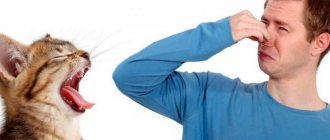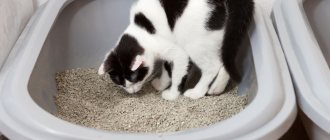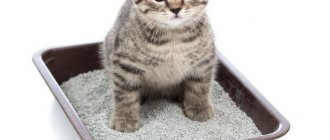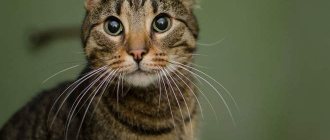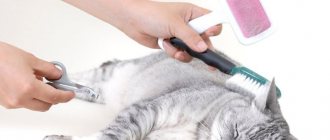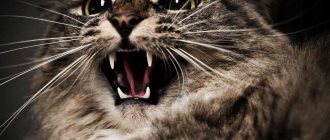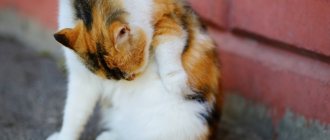If a small kitten does not eat, sleeps a lot and refuses to play, this is an alarming symptom that should prompt an immediate visit to the veterinarian. The reasons why a baby stops eating can be varied. A two-month-old kitten that has just moved into a new family is experiencing extreme stress. that is why in the first days he does not want to eat. A newborn baby may refuse to eat due to congenital diseases or too young age. In any case, it is important for the owner to find out the causes of the violation and try to eliminate them.
The dangers of not enough food for a kitten
An adult cat is able to survive for a long time without food or get by with a minimum of it. But for a small animal, nutritional deficiency can lead to serious problems. If a kitten does not eat anything or eats very little and poorly, this is fraught with:
- gastrointestinal diseases;
- anemia;
- pathologies of the liver and kidneys;
- breathing disorders;
- heart rhythm disturbances;
- developmental and growth retardation.
Of course, these complications occur when the animal eats poorly and eats little for quite a long time.
It happens that appetite disappears for just a few days, and then returns to normal. But if the kitten is thin and has not been eating well for a week or more, it’s time to sound the alarm.
What to do?
If you have taken into account all the rules for feeding kittens and knowing the reasons why the kitten does not eat, first of all you need to get rid of it. No reason - no problem. If you have ruled out the effects of stress, and the bowl and feeding area are perfectly clean and without any odor, then run to the veterinarian. It's better to be safe than sorry. Have your doctor examine a kitten that doesn't want to eat. If the examination reveals a disease, the veterinarian will prescribe the necessary treatment. Next, we have prepared some tips on what to do if the kitten does not eat anything, which may be useful to you.
Self-medication will not give results; it will only worsen the pet’s condition. Making diagnoses on the Internet is not the best way to solve the problem of kitten starvation. But even during treatment, appetite may not be fully restored.
Bottle with nipple, pipette or nurse cat
A bottle with a nipple, a pipette or a nurse cat is the solution for very tiny kittens. If the kitten is very small, then buy a bottle with a small diameter nipple so that it fits in the kitten's mouth, and a cat milk replacer. Or find a nurse cat. Perhaps one of your friends has recently given birth to a pet, so you can try to attach your starving baby to her. Just let them smell each other first. Some adult animals defend themselves from other people's children.
Don't try to force feed!
This can frighten a kitten who won't eat anything. Yes, sometimes the only way to prevent a small pet from dying of hunger. But this should be a last resort.
Place soft, wet food in a bowl
Only a little. Otherwise if it goes bad. After all, food must be fresh. If you want to offer natural food, you can try adding some boiled fish or lean meat.
When a kitten doesn't eat, he should at least drink
Therefore, put a plate with clean (filtered or boiled) water. If the baby does not know how to lap on his own, then he will have to drink water either through a pipette or through a pacifier, at least in small portions.
No fatty foods
Many people drink the broth. However, this is not the best option, since the body of a meowing fluffy is not yet ready to digest fatty foods. Especially when the hunger strike lasted for several days. A weakened body needs very light food. Yes, when the kitten does not eat food for only one day, and the animal’s age exceeds 2-3 months, then you can try giving it broth through a bottle. Just don’t add salt or add any seasonings. For meat, do not take pork or lamb, this is too fatty meat.
Try finger feeding
Alternatively, try giving from your finger. Drop a little on your finger (water, milk, low-fat sour cream, broth) and bring it to the baby’s nose. If he stubbornly turns away, do not “rape” him. Try a little later (in half an hour or an hour). If a kitten who does not eat from the bowl suddenly licks food from his finger, then drip more. Gradually move your finger closer to the bowl; perhaps the kitten will taste the food from your hands and try to eat from the bowl on its own. It is preferable to use soft food so that you do not need to chew for a long time, just licking it off the bowl would be enough. A good option is canned meat for children. They are without salt, the meat is perfectly chopped, and often they also contain cereals.
Contact the breeder
If you took it from a breeder, then ask him what to do if the kitten does not eat, whether the baby was vaccinated, what the baby was fed before the sale. Perhaps you are offering food that is unusual for him. Some purebred kittens are very fussy about food. Wrong manufacturer, wrong taste, wrong form. Therefore, contact the breeder and find out the details of feeding the baby of the breed you purchased from him.
Do not delay visiting the veterinarian, even if the kitten has started to eat. Let him rule out serious illnesses.
Still have questions? You can ask them to our site's in-house veterinarian in the comment box below, who will respond to them as soon as possible.
Possible diseases
In addition to completely harmless reasons, there are also those that are worth worrying about. We are talking about possible diseases of the pet. There are several options for what ailments can torment your furry friend:
- problems with teeth and oral cavity;
- indigestion;
- inflammation or wound.
Any healthy animal is easy to distinguish from a sick one. As a rule, cats suffering from the disease have decreased appetite, increased drowsiness and increased body temperature. There are also symptoms for which it is very important to consult a veterinarian.
Problems with teeth and oral cavity
Cats of any age are susceptible to this type of disease. Sometimes it is not so easy to determine what is tormenting your pet in the early stages of the disease. At first, the animal may simply refuse to eat, which the owner will explain as a slight change in mood, but if there is no appetite for a long time, you should pay attention to other symptoms.
Pets who have contracted an oral disease lose interest in food, because chewing food becomes painful or unpleasant. Usually such ailments are associated with plaque on the teeth. The cat's gums become inflamed, which causes him discomfort. Also one of the symptoms is bad breath and increased salivation.
Not only can a pet lose a fair amount of weight due to a long hunger strike, but it can also lose teeth if you do not consult a veterinarian in time. Therefore, it is better for the owner to more closely monitor the behavior of his beloved furry if he does not want to eat for a long time.
Digestive disorders
Cats often pick up various kinds of garbage they like from the floor, find food lying around in the most secluded corners of the home and taste it, and also swallow a lot of their own hair while licking themselves. It is not surprising that after such tastings, animals experience discomfort, heaviness and, possibly, even stomach pain, which is why they cannot eat normally.
Intestinal problems can be caused by insufficient water intake or stress. It won’t be difficult to spot problems in your cat’s health. He will vomit, possibly belching, diarrhea or constipation, flatulence and weakness. Eating in this state is out of the question.
Inflammations and wounds
The cat may experience discomfort both from internal inflammatory processes and from external damage. To find out if there is inflammation, you can measure body temperature, pulse and other indicators. If they differ from normal, and the cat does not eat and is not as active as always, you should immediately contact a veterinarian.
Possible reasons
The reasons why a kitten does not want to eat may not be related to disease:
- Stressful state. When a baby is suddenly taken away from its mother, it is not surprising that the kitten does not eat well - it is experiencing the first separation in its life.
- A kitten eats little if the food is unusual for it. Some breeds of cats are famous for their capricious disposition in relation to food - they will literally die of hunger, but will not touch food that they do not like or that turns out to be unusual.
- Weaning too early is one of the common reasons why a kitten has no appetite. This is usually what unscrupulous breeders do, trying with all their might to increase the number of matings and offspring to make a profit. When a kitten is tiny, it is accustomed to cat milk with a special composition. If he has not yet been accustomed to complementary feeding, then it is not at all surprising that the kitten does not eat or drink - he simply does not know how yet. Coping with such a situation is difficult, but possible. It is much easier to make sure in advance that the animal is already taking complementary foods and will not cause additional trouble.
- Sometimes the reason that a kitten has stopped eating can be completely banal - a new bowl for food or drink. Sometimes plastic products have a very pungent and unpleasant odor in the first days of use, which is why cats with a keen sense of smell simply do not smell the food - it is “clogged” by the unpleasant “aroma” emanating from the plastic. Children should be given food not in plastic, but in glass or ceramic containers; they do not contain volatile flavors and are highly hygienic. Before using such dishes, it is good to pour boiling water over them - this will both disinfect it and “kill” extraneous odors.
- Just like a foul-smelling bowl, dirt and debris around the area where cats are usually fed can deter animals from eating.
- The presence of helminths is a common reason for kittens taken from the street or accidentally refusing to eat. Worms cause severe intoxication of the entire body, so the baby begins to have digestive problems. He vomits and feels sick, he breathes heavily, does not eat or eats very little, but drinks a lot. The kitten is lethargic and thin, sometimes refusal to eat can alternate with unexpected bouts of gluttony. Helminth infections are dangerous, especially if it is a small kitten, so such symptoms should alarm the owners.
- Infections or diseases of internal organs. A kitten under 6 months of age does not have a strong immune system and can easily get sick. With infectious diseases, he sleeps all the time and lies all day, does not touch food, only drinks water, breathes heavily, and often feels sick even from drinking water. These signs indicate that the baby is sick and needs urgent help.
INTERESTING TO KNOW: How to switch a kitten to dry food
The most dangerous symptom is the animal's reluctance to drink. This can have various reasons: from a cold to a dangerous infection and even rabies. If this condition lasts longer than 2 days, the kitten constantly lies down, sleeps a lot, breathes heavily, does not eat or drink, you should immediately go to the veterinary clinic with it.
Causes of decreased appetite
There are quite a few factors that provoke a decrease in appetite in kittens. Some can be easily eliminated, while others are difficult to treat even in a clinical setting. Here are the main reasons:
- the animal eats poorly because the food does not suit it;
- decreased appetite is caused by changes in weather or living conditions (a kitten may not eat due to stress, just like a person);
- the owners overfeed the pet, and it protests, showing poor appetite;
- the baby doesn’t get enough attention or play and is sad, feeling bad “morally”;
- an infection has entered the body;
- there is any disease of the gastrointestinal tract, so the kitten refuses to eat;
- the animal eats little due to food poisoning.
If the kitten begins to eat poorly, you definitely need to figure out why. Often you cannot do this on your own. In this case, a veterinarian will help.
What to do to help the kitten?
The baby will be very lucky if the adoptive mother treats him normally and does not deny him food.
If the baby is not yet a month old, and he is left without a mother, there is only one way out - buy a special bottle with a mixture for kittens and feed the pet artificially. If the kitten does not suck the rubber nipple and feeding cannot be established, you can try to find a wet-nurse cat who recently gave birth to the same cub. When introducing animals, you should give them time to sniff, because some adult cats can aggressively perceive a stranger, even if he is a newborn.
If you suspect the presence of any disease, the baby should be shown to a veterinarian. Once the diagnosis is known, the doctor will prescribe a safe and effective treatment regimen. It is important for the owner to strictly follow all the doctor’s advice and recommendations and under no circumstances self-medicate. If the reason is an unpleasant odor from food or dishes, it is recommended to change the brand of food, and also choose bowls made of high-quality plastic.
What to do if a small kitten cannot eat and drink on its own?
It happens that a little purr is separated from its mother cat too early. Experienced breeders of purebred animals give the kitten to new owners no earlier than 3 months of age, when it already knows how to eat on its own and is accustomed to a certain food. If the kitten was taken away from the cat when it was very tiny or the baby was simply found on the street, it is likely that he simply has not yet eaten anything other than his mother’s milk. The baby doesn't know how to lap from a bowl. Moreover, he has no habit of drinking water.
Such a cat will have to be fed milk from a pipette or bottle with a nipple. Moreover, it is recommended to use a special cat's milk substitute. Then you can gradually teach the kitten to lap from the bowl and eat wet food. A good way is to offer the baby food from your hand, sometimes this helps kittens start eating new food.
Reasons why a kitten does not eat food
Let's figure out why the kitten doesn't eat anything? What made the baby starve?
Stress
No matter how proud cats are, they are very sensitive. It would seem, what’s wrong with moving or a change of scenery? But such little things can affect the psychological state of the animal. The animal needs a couple of days to adapt to the changed conditions. If possible, eliminate all possible sources of stress and provide your baby with peace. Let fresh water and some food be within his sight, but away from people. Perhaps the kitten needs a calm environment and privacy.
Too young
Some people buy kittens that are too small. Unscrupulous breeders are trying to “fuse” kittens as quickly as possible so that the cat goes into heat faster and gets offspring from her again. As a result, kittens do not yet know how to eat on their own. Hence the hunger strike.
The baby would be happy to eat a hearty meal, but he can’t, he doesn’t know how. To prevent the baby from starving to death, you will have to purchase a special cat's milk substitute (it costs a lot, but is ideal for kittens) and a bottle. Cow's or goat's milk are not suitable because the kitten's intestines cannot digest such fatty milk.
Environment
Cats are very clean (with rare exceptions), so they are uncomfortable with the fact that their feeding area looks untidy or dirty. The animal will endure to the last, but will not touch even its favorite food if the bowl is poorly washed or there is a lot of garbage around the feeding area.
Strong odor from food or bowl
Some bowls made of polymers, especially in the first days of their use, have a strong, unpleasant odor. Cats have a keen sense of smell. And such a “bright” chemical smell will repel the pet from food. In addition, food can smell like plastic and have an unpleasant aftertaste. But even if the bowl (in your opinion) no longer smells, the detergents you use to clean your cat's bowl may have a strong odor. do not forget that they also have a fairly diverse chemical composition. Still, it is better not to use chemicals when washing dishes for feeding an animal. If you want to kill the infection, then simply pour boiling water over the bowl (if the manufacturer and material of the dishes allow this).
Helminths
Some types of parasites, on the contrary, awaken a brutal appetite in the baby. But still, in most cases, the tiny organism is not able to fight helminths. All the forces of the immune system are spent exclusively on the fight. Therefore, there is absolutely no money left for food consumption. Modern veterinary drugs can be given to tiny kittens. Some anthelmintics can be given just once, but it is usually recommended to repeat the procedure after 10-14 days.
This is due to the fact that during this time those parasites that were not affected by the first dose reach a different stage of development. And now on it they become sensitive to the active ingredient of the anthelmintic. Be sure to carry out 2 procedures for expelling parasites, even if you do not find any worms in the kitten’s feces or vomit. Perhaps his body contains just the larval stage, which is covered with a dense shell that does not allow the drug to kill the helminth.
Infectious diseases
The little kitten does not eat because an infection has raged in its body. At least remember yourself during the flu. Do you eat a lot? And a baby, especially if he is too early or has just been torn away from his mother, can have a huge number of life-threatening diseases. Any infection clings to his fragile body. The immune system is not yet very developed. That is why it is so important to carry out preventive vaccinations according to age on time. This can save the purr from a lot of problems.
Let's summarize: what to do if the kitten does not eat or drink
First of all, you need to carefully observe the animal. If there are no other alarming symptoms, you can try changing the food, bowl, and minimizing stressful situations.
But if the baby’s condition causes concern, and the owner cannot figure it out on his own, there is no need to waste time asking questions on various forums. You need to immediately take the animal to the veterinarian or invite a doctor home. An in-person examination and tests will help identify the exact cause of the ailment and prescribe treatment in a timely manner. If the fears are not confirmed, a professional doctor will give recommendations on proper nutrition. And just making sure your pet is healthy is never a bad idea.
Useful links:
Common Causes of Malnutrition
In most cases, malnutrition is associated with stress, age, or poor food quality. Sometimes kittens eat little due to health problems.
Bad feeling
Most often, a deterioration in appetite due to poor health is associated with factors such as:
- Vaccination period. After vaccinations, the body fights the introduced pathogen, which can lead to a lack of interest in food for 1-2 days.
- Infections. They can manifest themselves in the form of diarrhea, the presence of impurities in stool, cough, etc.
- Heat. In the summer, cats tend to eat less, as the body spends less energy on heating.
- Hormonal changes. Most often, a kitten begins to worry at 7-9 months during puberty.
- Diseases of internal organs. Dental pathologies, tumors, etc. can cause refusal to eat.
- Shedding. Long-haired cats and animals with thick fur coats are especially affected. Wool accumulates in the stomach and can cause vomiting or intestinal obstruction.
- Taking medications. Antibiotics often cause the condition to worsen.
- The period of estrus or sexual hunting. At this time, the reproductive instinct comes to the fore, so animals worry less about hunger.
- Intoxication. May be associated with the ingestion of chemicals into the body, internal diseases, poor-quality food, etc.
We suggest you read: How to wipe a cat’s eyes with increased lacrimation and acidification Sometimes cats are diagnosed with anorexia, but in most cases it is secondary and occurs as a consequence of another disease. Sometimes this condition can be observed in eating disorders.
In their natural environment, cats expend a lot of energy to catch small prey, so they always try to keep themselves full and eat a lot. Pets don't need to hunt, so they have poor portion control.
Cats are conservative and sensitive, so any changes or discomfort can cause the animal to refuse to eat. This happens due to stress. It can be provoked, for example, by moving. Changing family composition also affects the pet's well-being. Young kittens often do not eat well when they arrive at a new home. This phenomenon is temporary: the situation improves after 3-5 days.
The animal may not eat well if the room is not clean enough. Most often, this is observed in pets who are kept in enclosures and cages. They are unable to leave the area and contaminants accumulate, causing stress.
Little age
Month-old and younger kittens may have trouble eating due to constipation. In babies, the gastrointestinal tract is unstable, so they need massage to empty their bowels. Normally, the mother licks her kittens regularly to encourage muscle relaxation and the release of feces and urine. If for some reason the cat cannot take care of the cubs, the owner will have to monitor the digestion of the pets.
To get the kitten to go to the toilet, you need to wet a rough cloth with warm water and start stroking its belly. Then you should go down to the tail area. First, the animal will relieve a small need, then a large one.
Malnutrition may not be due to poor appetite, but to a lack of milk during the mother's lactation. In such cases, kittens continue to meow even after feeding. They gain weight by less than 5-7 g per day or lose weight altogether. If you weigh them before and after feeding, the difference will not be noticeable. To prevent malnutrition, you need to buy a special cat's milk substitute in the form of a mixture and supplement your pets with it.
ADAPTATION OF A KITTEN IN A NEW HOUSE
A kitten in a new home means both unlimited joy from its stay and a great responsibility! Whether you bought and brought a kitten into the house or the kitten came into the house on its own, it doesn’t matter, the main thing is that it is now a member of the family who needs your love and care. Show as much attention as possible, call by name. You can choose a pet name here.
A kitten in the house will probably be sad and bored for 2-3 days, but within a week it will completely get used to it. Try to pay him more attention, pet him, play. If the kitten feels uncomfortable in the new home and hides, give it time to sit out and get used to the situation. Below are a few points that are important and need to be remembered when you have a new kitten in the house.
Prevention
To prevent the development of infectious diseases, pets must be vaccinated. Even if they live in an apartment and do not go outside, they have a risk of becoming infected.
The veterinarian conducts an examination and prescribes additional examination.
Living conditions play an important role in maintaining the health of a cat. Adequate, high-quality nutrition is a guarantee of high immunity. Pets should not be fed from the table or given human food.
To prevent the cat from getting bored, they constantly play with it and teach it different tricks. Such activities will tax her intellect and she will not get bored. If you need to move or create another stressful environment, you should first give the animal a mild sedative.
If a cat lives in an apartment, it is still treated for parasites with appropriate means every six months.
When you notice the first signs of thinness, it is better to contact a veterinarian. Only he will be able to correctly determine the cause of the condition and prescribe treatment.
The cat doesn't eat well, but is active: should I worry?
Cats sometimes get into a state where they don’t want to eat, because there is another, more interesting activity - playing, trying to seize the moment and sneak into the room where there is an aquarium or a cage with a parrot. Perhaps the body turns on a mechanism to get rid of excess weight.
Finally, there was a transition to a different, better quality diet. Less food contains more calories. The feed mixture included a feed intake limiter—dietary fiber.
The yield was reduced and its smell decreased because the digestibility of the feed increased. The owner compares the current food intake with the previous one and laments that the cat has begun to eat less. If the cat begins to eat less, but feels good and looks neat, there is nothing to worry about.
Be sure to read:
A cat sneezes: causes, symptoms, what to do, treatment methods, what should alert you
What should the owner do?
Every owner begins to worry when his beloved pet refuses his previously favorite treats. Bad thoughts begin to come into your head, and you want to somehow find out the reasons for this behavior of your furry friend.
In cases where there is no cause for concern, the owner simply must surround his pet with care. It is also important to be careful about what you feed your cat. Poor quality food will repel it, and the animal will go on a hunger strike.
If there is a sudden change in food and the cat immediately stops eating, it is recommended to try gradually introducing new food into its diet. It is possible that the problem lies in the dishes from which the pet eats. When the owner decides to please his mustachioed friend with a new bowl, he may not think about how convenient it will be to eat from it.
It is better not to traumatize the animal’s psyche by frequent changes of environment, at least the one in which it spends the most time. It is better to make the feeding area as comfortable as possible so that nothing blocks access to food.
When it comes to pet illnesses, it is recommended to immediately contact a veterinarian. You should not self-medicate. This may seem harmless, but it can actually cause dire consequences. Without the help of a veterinarian, it will not be possible to give your pet the correct diagnosis, because he himself is not able to specifically indicate the sources of pain.
Felines are very unpredictable; one minute they can actively sit in front of their owner and beg for a piece of treat from the table, and the next they arrogantly turn away without even sniffing it. You don't have to start panicking immediately after this. Perhaps the cat simply lost his appetite. But if this behavior continues for a long time, the cat owner should be wary. Animals can't talk, so they won't tell you what's bothering them.
The article is for informational purposes only. Contact your veterinarian!
When a cat refuses to eat for a long time, but regularly drinks water and does not have accompanying symptoms of diseases, the owner should:
Complete refusal to eat
Complete refusal to eat, reluctance to drink water, constant lethargy of a pet is a serious reason to consult a doctor. But sometimes such symptoms accompany severe stress.
In this case, the cat should not be disturbed for a couple of days; perhaps the animal just needs to be in peace and quiet. If the cat's condition does not change after some time, the visit to the clinic cannot be postponed, otherwise the animal may die.
Algorithm of the owner’s actions in case of complete refusal of food:
- Provide your pet with a comfortable, quiet resting place away from drafts.
- Place a bowl of clean water next to the bed.
- Organize regular ventilation of the room.
- Protect the cat from contact with household members and other pets.
- Monitor the condition carefully, and if the condition worsens, take it to a veterinarian.

